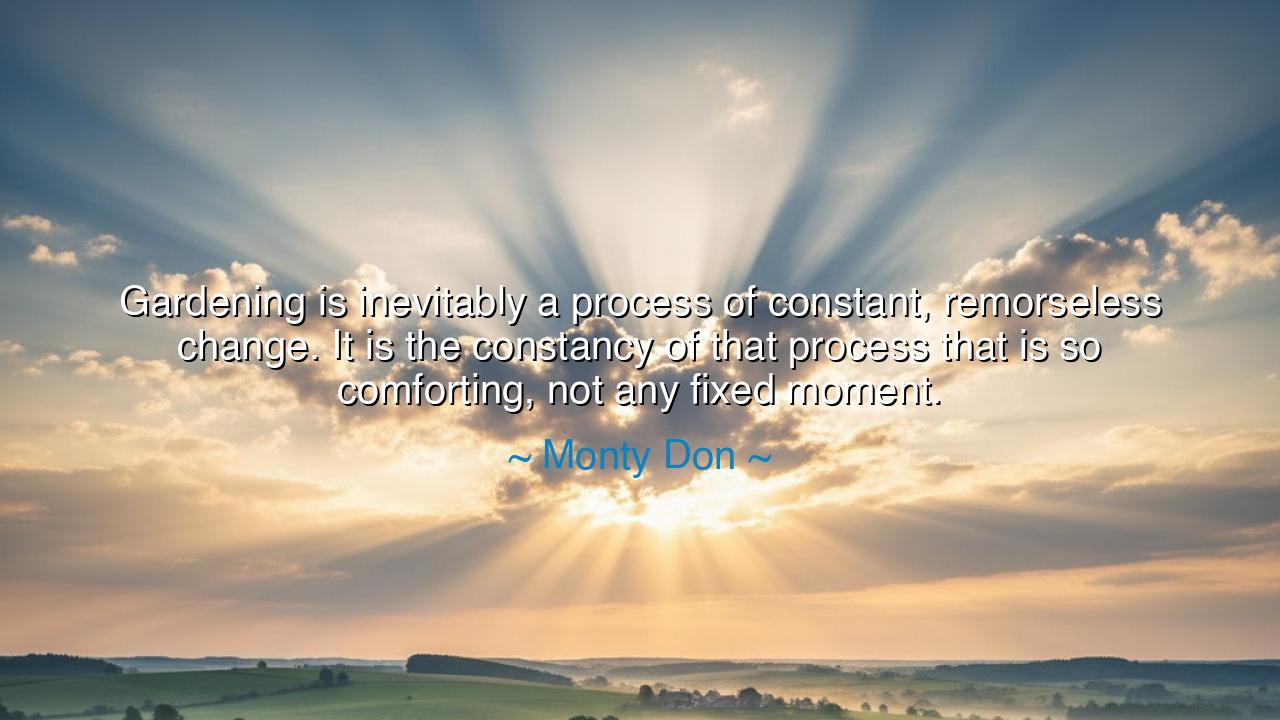
Gardening is inevitably a process of constant, remorseless
Gardening is inevitably a process of constant, remorseless change. It is the constancy of that process that is so comforting, not any fixed moment.






The words “Gardening is inevitably a process of constant, remorseless change. It is the constancy of that process that is so comforting, not any fixed moment” were spoken by Monty Don, one of the most beloved voices of modern horticulture — a gardener, philosopher, and poet of the soil. In this reflection, he reveals a truth that transcends the garden itself: that life is not meant to be still, and that our peace does not come from trying to preserve the moment, but from embracing the rhythm of perpetual change. It is not the flower in bloom that teaches us serenity, but the knowledge that the cycle — seed, blossom, decay, and rebirth — never ceases.
When Monty Don speaks of “constant, remorseless change,” he does not speak with despair, but with reverence. For in the garden, he finds the mirror of creation itself — a world that is ever dying and ever being reborn. The gardener who plants in spring knows that frost will one day return, yet still he sows. He prunes, he waters, he waits — not because he can halt time, but because he has learned to live within its movement. The comfort, as Monty says, is not in holding the flower still, but in trusting the hand of the season that gives and takes with divine precision. In the garden’s unending cycle, he sees the eternal law of life: that constancy is not stillness, but the faith that transformation itself will always endure.
This wisdom echoes the teachings of the ancients. The Greek philosopher Heraclitus declared, “Everything flows; nothing stands still.” To resist change is to resist existence itself. The same truth was known to the Buddhists of the East, who taught that all suffering arises from clinging to impermanence. Monty’s garden becomes a living scripture of that truth — a place where impermanence is not tragedy but blessing. The fallen petals feed the soil; decay gives rise to new life. To mourn what has passed is human; to see the beauty in its passing is divine.
There is a quiet heroism in this way of seeing. Consider Emperor Marcus Aurelius, who ruled Rome yet wrote as a humble philosopher. Amid wars and loss, he found solace not in permanence, but in understanding that change is the nature of the universe. “Observe,” he wrote, “how all things change into one another — and you will find peace.” Like Monty Don in his garden, Aurelius found serenity not in control, but in alignment with the great current of life. The gardener and the emperor, though worlds apart, share one wisdom: accept the constancy of change, and you will not fear the turning of time.
In the garden, this truth is lived daily. The gardener wakes to frost-bitten leaves, to buds that did not bloom, to weeds reclaiming the soil. Yet he does not despair. He kneels, touches the earth, and begins again. For he knows that nothing stays as it is, and yet everything remains part of the same eternal rhythm. The comfort Monty speaks of is born of surrender — the deep knowing that we are not here to fight change, but to participate in it. The gardener who works with the seasons learns patience; the one who fights them learns frustration.
To live as a gardener is to live as a philosopher of the soul. The seasons of life — youth and age, gain and loss, joy and sorrow — are but the weather of existence. When we cease to chase the illusion of permanence, we begin to see the divine harmony that underlies even decay. What is lost in one form returns in another. The flower that withers becomes the seed of tomorrow. So too in our lives: every ending, if received with grace, conceals the seed of new beginning.
The lesson of Monty Don’s words is simple yet profound: peace does not lie in preserving what is, but in trusting what will be. True comfort is not found in the illusion of stillness, but in the faithful rhythm of growth, decay, and renewal.
Practical actions: When change comes — whether in love, work, or self — meet it not with resistance, but with reverence. Tend your life as you would a garden: prune what no longer grows, nourish what still blooms, and trust that what dies will feed tomorrow’s beauty. Spend time among living things; watch how the earth teaches patience and acceptance. For as Monty Don reminds us, the constancy of change is not something to fear — it is the quiet, eternal heartbeat of life itself.






AAdministratorAdministrator
Welcome, honored guests. Please leave a comment, we will respond soon